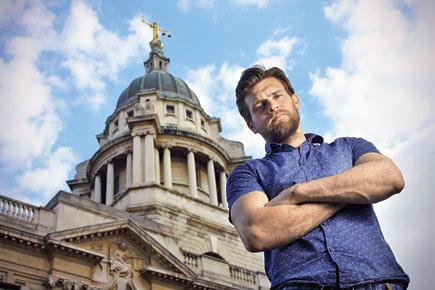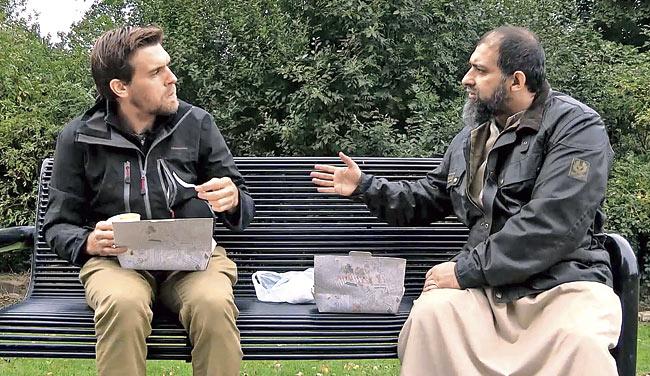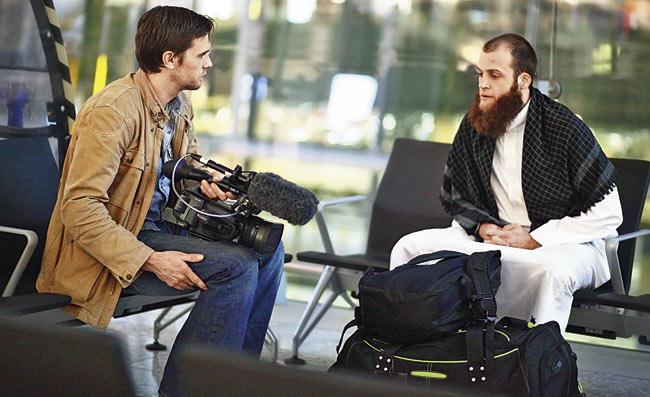At a time when Al-Qaeda announces a new front for terror in India, and UK Prime Minister David Cameron warns that we are in a generational war against Islamist extremism, a documentary throws light on why Westerners go to other countries for jihad

Western nations are grappling with a growing problem, the rise of the home grown jihadist. In this interview, filmmaker Robb Leech, talks about his stepbrother Richard, who shunned his Western values, upbringing and became a radical. Richard, also known as Rich then turned to terror. Rich or Salahuddin is currently serving a jail sentence in the UK.

Robb Leech
ADVERTISEMENT
Robb Leech’s to-be-aired BBC documentary called, ‘My Brother the Islamist’ and then, ‘My Brother the Terrorist’, tries to understand why the white Westerner turns to jihad. It is also an attempt by Robb to tell the story of the journey of a middle-class white boy, to a Muslim man convicted of preparing terrorism acts. It is a story which we hear being played across the Western world today.

Salahuddin, AKA Richard, Robb Leech’s stepbrother
Q. Some background about your childhood with Richard, in what way is he your stepbrother?
Robb: We were both from broken homes, our biological parents divorced when we were very young, and in 1992 my Dad married Rich’s mum so we became step brothers. I looked up to Rich as an older brother, and being a year older, he often looked out for me. We both loved football and the TV programme ‘Gladiators’. Religion was never a part of our lives growing up, although I went to a Church of England school and had to sing hymns and listen to bible stories, Rich went to a non-religious school, who were good at football.

Robb (l) and Alyas Karmani
Q. Do give me a thumbnail sketch about Dorset, itself... as a place?
Robb: Weymouth (the town in Dorset we are from) is your quintessential English seaside town. A farmer growing a very large cabbage would often make news headlines.

The Imam and with Salahuddin
Q. Did you discern that Richard was moving away from you all (as a family)
Robb: Yes, Rich first moved away when he was 16, to live with his father, and from then on was always more distant. We always saw him at Christmas, but he was always away somewhere else. In his early twenties he moved to London, and from then on he became increasingly distant, but not in a scary way, just like he was changing as a person, becoming interested in Christianity and religion and we didn’t see a whole lot of him. It was only when he converted to an extreme brand of Islam years later that we realised he had moved so far, and that transformation happened within a year.
Q. When you look back now, do you think there were any red flags that you might have missed?
Robb: Rich was, because of his parent’s divorce, I think a little insecure, lonely and restless. But I felt the same too, and I imagine most people go through a stage of feeling like that. In retrospect, maybe his increased detachment from the family and increasing interest in religion may have been a red flag, but we never thought of radicalisation and Islamic extremism as a potential risk. If I look back now, knowing what I know, I would probably say the biggest red flag was the divorce of his parents and his father’s decision to move out of the country. But how would you ever consider that a red flag for him becoming an extremist 20 years later?
Q. There is a stereotype of the terrorist as one who is brainwashed because of a lack of education, poverty, crime... Today’s terrorist though may be educated, suave, have no criminal background. Do you agree with this?
Robb: Some of it. Disillusionment is key. I think a lack of identity, not having a stake in society, or not feeling valued, are probably the biggest factors. Often these people are looking for empowerment, and the ideology gives it to them.
Q. When did Richard convert? Did the family know of his conversion?
Robb: He converted in the summer of 2009. Yes we knew soon after. We were about to go on a family holiday to Rhodes when he called to say he had become Muslim, and could no longer come with us. We thought it was strange, but accepted it. It was only after we came home and saw him in a newspaper article that we realised he had become an extremist.
Q. What was the reaction? Why did he convert?
Robb: Rich didn’t just convert to Islam; he converted to an extreme version of it. When we returned from holiday, he had begun sending emails to family members warning them of going to Hellfire etc, so it was clear something was not right. Over the coming weeks and months we realised the extent of his transformation, so the family were very concerned, and I suppose didn’t know what to do. I would say he converted because it offered a solution to his internal battling and the moral dilemmas of having the responsibility to make your own decisions, and the everyday struggle of living in a world he probably didn’t feel a part of.
Q. Where did he hear Anjem Choudary speak?
Robb: I believe he was approached by some of his followers at a carpentry workshop, and it went from there.
Q. Did you see any change in your brother’s appearance? A different way of dressing? Did he stop watching TV? Listening to music or alcohol?
Robb: The last time I saw Rich before he converted, he had become a Christian. We shared a room for two weeks on a family holiday in 2008. He had changed then, but he was always changing in little ways. He had given up drinking more or less at that point, although I remember he went to watch a football game and had a pint of beer. All of the big changes happened either very quickly around the time he converted, or during the following year that I didn’t see him.
Q. Did you feel a tension with him ever, over any kind of belief? What did he say about bomb blasts in Britain?
Robb: Rich always told me that he thought killing innocent people was wrong, and would only make the suffering of Muslims worse in the long run. However he had always very clearly stated his wish to fight and die for Islam, on the battle field, fighting jihad.
Q. Was the Iraq war (where Tony Blair joined George Bush) a trigger for your step brother to convert?
Robb: No I don’t think so, Rich converted six years later.
Q. There is a belief that converts are more hardened than those born into the faith. Do you think this is true?
Robb: Yes, firstly they have a lot to prove. They have converted for a reason, and are therefore usually more motivated and fervent about their faith. Crucially, they do not have the Islamic knowledge and background that traditional Muslims have, and therefore can be very susceptible to charismatic ideologues who only teach certain aspects of Islam, interpreted in a very extreme way.
Q. Do you understand better why these Westerners enjoy the comforts of the West, take social security, live as refugees in the West and then turn on their country?
Robb: Many of them are from troubled backgrounds or have identity issues. They feel disenfranchised and search for something that gives their lives meaning and makes them feel important and powerful. Extremism gives them what they need to feel like valuable people. They’re also fed a very strong narrative of torture and oppression against Muslim people worldwide, at the hands of the West. They saturate themselves in horrific images of suffering, pain and death, and get very, very angry. They are told they have a responsibility to help those people. They see the West as murderers and the enemy. Using the West for social security etc, is encouraged, because it is damaging in a small way.
Q. Were your parents in denial about their son (initially) becoming so radical? We see so many reports of parents simply refusing to accept that their son/or daughter may be allied with terrorists. Is it because they do not know or do not want to believe it?
Robb: No, they accepted it quickly.
Q. Why have you made this film?
Robb: I made the first programme, ‘My Brother the Islamist’ because I was in a unique position to tell a story which hadn’t been told before, and I knew it was important. I made the second programme, ‘My Brother the Terrorist’ because I wanted to bring the story up to date, but also try to shed a fresh perspective on the topic.
Q. Why is your stepbrother in jail? Was there a specific incident for which he is in jail?
Robb: He was jailed for preparing to commit act of terror. He planned to go abroad to Pakistan to join the Taliban.
Q. Are you afraid you might become a target?
Robb: Yes, I am more in the spotlight, and have faced some hostility, but the positives outweigh the negatives, and I wouldn’t back down from doing something I believed in, if somebody threatened me.
Q. Are you embarrassed in society?
Robb: No, certainly not. If anybody is to blame for the radicalisation of young people, it’s society itself.
Q. UK obviously has a huge problem right now. What is your message to other siblings/families in a parallel situation?
Robb: If you suspect something, speak to a local Imam, they won’t bite.
My Brother the Islamist is scheduled on BBC World News on September 27 at 6.40 am and 7.40 pm and September 28 at 1.40 pm. The sequel My Brother the Terrorist will be broadcast on October 4 at 6.40 am and 7.40 pm and October 5 at 1.40 pm.
 Subscribe today by clicking the link and stay updated with the latest news!" Click here!
Subscribe today by clicking the link and stay updated with the latest news!" Click here!







